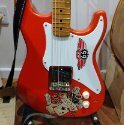Leaderboard
Popular Content
Showing content with the highest reputation on 16/08/23 in all areas
-
Progress has been made with colour televisions, telephones, computers and recording equipment, too. There's no reason why guitar manufacturing should not improve.2 points
-
Hey, if there's ever an android replica of Jimi's fingers - or, hell, at that Link Wray's! - I'll happily have my own organic ones chopped off to upgrade!1 point
-
I've seen a surprising number of gigging musicians wielding Squiers over the years; JHS's Vintage brand are also fast gaining a gigging following in the UK. There's something to be said for the utilitarian - "It's a tool" approach. Especially if you, like me, prefer Fender styles for the most part - much easier upgraded, or returned to stock / parted out without great loss if you need/ want to move them on. There is certainly a danger in falling into the trap of replacing bits here and there to "upgrade" if you buy with the notion that it 'needs' "better". Unless buying specifically for a project to put together something not commercially available, I have learned to get used to a guitar and let its personality bed in first. This is where I go all woowoo, but I've seen over the years one too many guitars that just had... something.... lose that mojo once bits started getting replaced to "upgrade". I won't be precious about replacing parts on my HBs if and when something breaks or I find in use I want something more. The real test of my resolve on this will be if I ever pick up one of their Strats; I'm not planning that right now, but if they did a left handed version of the Anniversary model Strat except in a more 50s vibe, 21 frets, skunk stripe and all - the ST-62DLX would be a very good base for this, just add stainless steel frets and a LPB body.... I'd likely buy one. The test of my resolve would be to give that thin trem block a fair shake before trying to put a bigger one in there. In practice, though, I keep hearing from players which have experienced one that it really loses nothing for the slimmer block... In terms of getting cheaper - yeah, advances in CNC production have really benefited guitar manufacture for sure. I remember guys thirty years ago marvelling over the Squiers that were then £120 new (about £250 now) compared to more expensive guitars they started on, and now I'm doing that myself. Of course, HB also benefits from basically being able to offer wholesale prices at retail due to the business model, which helps! And, I think, without the "Heritage" brand to play on, they also need to be a bit better than the direct competition to find the market. In my experience they are succeeding because they are. I've got no time at all for the common sneer, popular on particular US guitar websites, of "Guitars for lawyers and dentists". Possibly partly because I *am* an academic lawyer, and I'll never be able to afford / justify a guitar at the sort of money 99.9% of those bearing to Gibson name, or any US Fender nowadays, go for. Nonetheless, what I do see in practice is a lot of expensive guitars being purchased as luxuries by guys working in various, high-paying jobs who play and, quite rightly, want to enjoy their money (if I was on Beckham's money or a Court of Appeal judge's salary, I'd have two or three Gretsch 6210s, including the Brian Setzer models. Given the sort of money a Musk or a Zuckerberg has, I'd quite probably have the Fender custom shop build me a dream Strat - though just to be an awkward cuss I'd want them to label it as a Squier!). Working musicians, however, save for those who have hit the real big time, I increasingly see playing mid-tier guitars. Fender Players, Vintage brand guitars (sometimes their 'proshop' versions, an interesting concept itself - It would be fascinating to see how a Harley Benton take on that concept would go). Even some who do have the big money guitars prefer something more 'affordable' to play live. I've come myself back to the mid-price stuff, with Harley Benton a real prize find for both their excellent value and - significantly - the sheer range of left handed options they offer. When I started playing, I wouldn't really have noticed the difference between a US Fender and a Squier. Then I got to a point I could. There comes a time in life, however, when I realise I'm never going to be a rock star, and saving for two years to buy "the best" isn't always the best course of action. I think with experience I've just developed the confidence to know what does the job I'll need it for, to know that, yes, spending x more will give me Y improvement / difference, but knowing whether that difference is worth it to me. It's a nice place to be. Sure, if the lottery win came in, after the big house in Zone 2/3, the new leather jackets and the motorcycle, I'd buy a couple of dream guitars, but there's a certain joy in finding I have as much fun with my HB Junior as I do with my Fenders, at a much lower buy in. Maybe - to circle back to your comment above - it really is as simple as it sinking in that a more expensive guitar won't make me any better a player, and it's all about enjoying playing it rather than any cachet it might have in and of itself. Perhaps it also comes into the mix that although I have (with some to be sold, and others to replace them) about a dozen guitars (including basses and acoustics), I'm buying to have fun playing them rather than to 'collect' as such. If I were looking to 'collect' I'd possibly be more focussed on a specific, maybe bigger, brand - or on keeping some of what I'm letting go (Westones and a Steinberger Spirit in particular) as those are perhaps much rarer than what I have chosen to replace them with.1 point
-
There's nothing to change on most guitars for stage use, except for one's personal satisfaction. They're almost all 'fit for purpose', in the right hands.1 point
-
The Classic Vibe series is sort of Squire's premium guitars I guess. I suspect you might need to change the pick ups if you want to use them on stage. Apart from that they're pretty solid1 point
-
Very true. To my mind, as long as the body and neck are comfortable and reasonable then I am happy to mod the rest if necessary. I have even gone down the road of just buying neck and body (or even just a wood blank) separately and making up my own to my own spec, but it ends up costing quite a bit more than buying something akin to a Squier Classic Vibe. The only bit I would struggle to do in a build is the neck itself, so have used the same necks on several different projects. But by the time you have bought new bridge, machine heads etc you may have well just bought something mid range and keep those parts, just upgrading electronics etc, but the Squier CV in particular (as well as other mid range brands - Vintage, Yamaha, Cort, Ltd etc) are actually pretty good and don't need a lot done except for personal taste. And although they are not getting actually cheaper necessarily, they are when you consider inflation. And spending £400 on a mid range guitar today gets you something you could only have dreamed of 20 years ago for the same money.1 point
-
There are a few things which are not getting cheaper though. I guess most guitars are made by machines now, and that the biggest difference between a low priced guitar and a premium is in type of wood, pick ups and things like that. I'm starting to go down the path of picking up more reasonably priced guitars myself. I have a couple of premium guitars, I would never pay that much for premium versions of some of the guitars I'm getting now though. Also, lower priced guitars are sometimes excellent for modding, not sure if it will save me money, I can at least mod it to my own specs though1 point
-
There are definitely some great guitars now for reasonable cost with the advances of manufacturing. I assume manufacturers also realise that there is a huge market there for reasonable instruments to get players hooked and invested in a brand. But the principle is the same as it always was, it is a case of diminishing returns and you still get premium guitars from all brands that just make everything just that little bit smoother, nicer, better compnents and with more character (and a lot more money). For those gigging every week, those more premium guitars still make a lot of sense, but the lower and mid priced guitars are great options as backups or for us beginner or intermediate players and can be a great base with which to uprgrade as you go along. For myself, I have done the custom order and US Fenders path but realised that using a different instrument gets me excited and forces me to experiment with other styles and licks that I wouldn't have done, so rather than one or 2 premium guitars I now have 10 reasonable ones in different styles. I still spent the same money but now have more choice and more to store...!1 point
-
1 point
-
1 - It's all in the fingers. 2 - Have a look at Lace pick-ups, they have some original concepts with excellent tones (Our Eldest built his guitar with those; they delivered beyond expectations...). 3 - Idem Filtertron pick-ups, for another 'colour' (Gretsch, TV Jones..?). 4 - It's all in the fingers.1 point
-
In that case, contact Bergen Backline; they will know who to confide your guitar to. No personal experience of them, but they are reputable, with wide contacts. Worth a visit..?1 point




.thumb.jpg.2f0f241a63381e5644f287abacd76760.jpg)